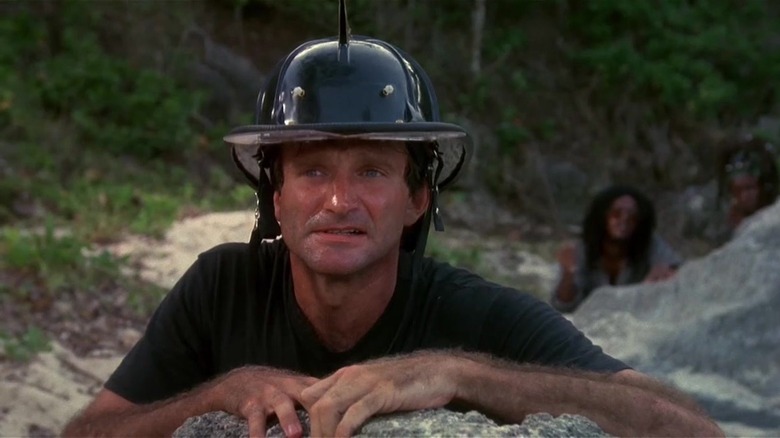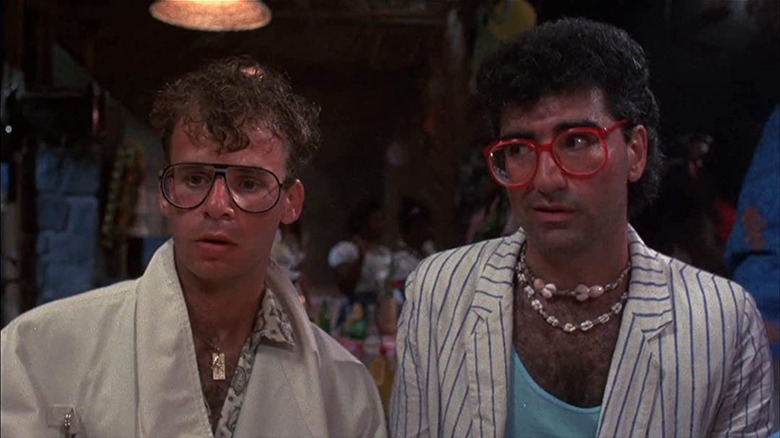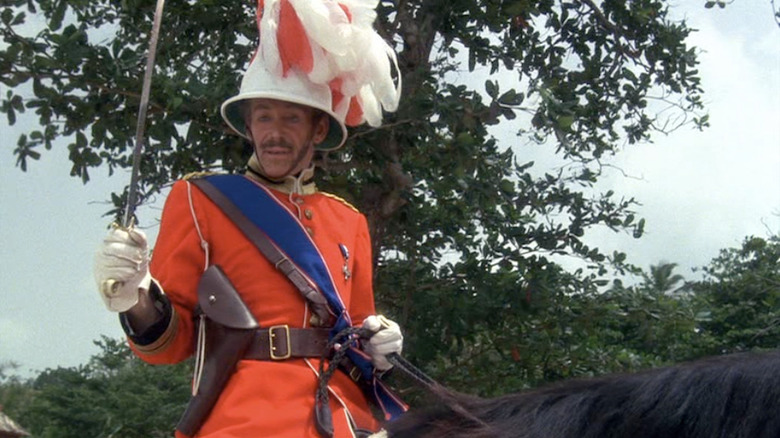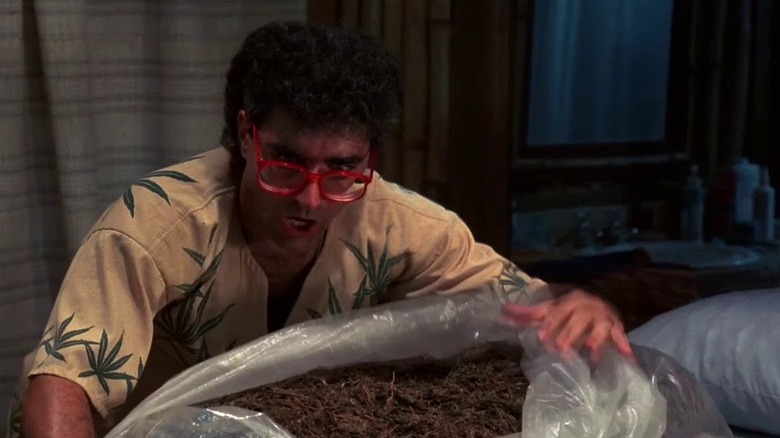Even A Performance From Peter O'Toole Couldn't Save Robin Williams' Club Paradise
There was every reason to expect "Club Paradise" would be the comedy smash of Summer 1986. Harold Ramis was two-for-two as a director thanks to "Caddyshack" and "National Lampon's Vacation," and scorching hot off the blockbuster success of "Ghostbusters." Ramis had reunited with his "National Lampoon's Animal House" collaborator Chris Miller to hammer out the story, and hooked up once again with his "Caddyshack" co-writer Brian Doyle-Murray for the screenplay. And then there was the cast: Robin Williams, Peter O'Toole, Rick Moranis, Eugene Levy, Andrea Martin, Joe Flaherty, Robin Duke, and Mary Gross. How could a film stuffed with this much comedic talent possibly miss?
Aside from Ramis and Levy playing a couple of hapless, horn-dog tourists who inadvertently score a trash bag full of marijuana, just about nothing works in "Club Paradise." The notion of a retired Chicago firefighter (Williams) starting up a ramshackle Caribbean resort with his disability money sounds promising, but the film's key pieces seem completely out of place, while the screenplay fails to generate any momentum via its military coup plot line. What went wrong? Sadly, the movie's problems start with the casting of Williams.
A tale of two comedies
If you're wondering why a Ramis-directed comedy about a scheming Chicago fireman didn't star Bill Murray, your instincts are spot-on. The role of Jack Moniker was conceived for the laid-back comedic dynamo, but he turned the part down. At this point, the screenplay should've gone right back in the drawer, but Ramis plowed ahead, reconceiving the lead character as a hyper-quippy, well-intentioned dreamer who wants to transform his dilapidated digs into a first-class tropical getaway.
Teaming with a master of improvisation like Ramis seemed like a slam dunk for Williams, whose stream-of-conscious brilliance had thus far been ill-served in movies. In Dave Itzkoff's biography "Robin," Ramis expressed optimism that he could bring the stand-up Williams who absolutely slayed on stage to the big screen:
"I felt that Robin has never been seen as himself in films," Ramis said. "He's not as quirky as he was in Garp or Moscow on the Hudson, nor is he a schlemiel, as in The Survivors. In Popeye he was hidden. Trying to get an actor to be himself is tough. They much prefer to play other roles."
Co-starring Peter O'Toole as... Bill Murray?
Turning Jack into a whirling dervish meant the character of Governor Hayes had to go from being an uptight ally to a blasé charmer – ergo, John Cleese was out, and Peter O'Toole was in. The great British actor at least seems to be enjoying himself in the movie (understandable given that most of his scenes are with the incandescent Joanna Cassidy), but he never establishes much of a rapport with his co-star. Murray and Cleese would've been a fascinating combo; Williams and O'Toole, on the other hand, appear to be in two completely different movies.
Ramis wanted Williams to be comfortable on set, so he worked out a deal where his star earned one ad-libbed take for every scripted one. Unfortunately, few of the star's zingers are anywhere as uproarious as his stand-up material. In retrospect, Williams admitted that he felt strait-jacketed on the set of "Club Paradise." "I took on slight projects, thinking, 'I can fix this. I got suckered into a couple films like that.... I thought, 'Well, they'll give me the freedom to do my thing,' but it turned out they didn't."
Paradise lost
The critics concurred. "Club Paradise" was almost universally panned. Warner Bros released the film with little fanfare on July 11, where it finished fifth at the box office, two spots behind the Ramis-scripted and -produced "Back to School," which had been in theaters for five weeks. The film quickly vanished from theaters, and failed to find a cult audience on video and cable because, well, it just wasn't any good.
Fortunately for Williams, he had "Good Morning, Vietnam" on the horizon, which would wind up being his first blockbuster and earn him an Academy Award nomination for Best Actor. As for Ramis, he was about to hit a creative dry spell with two misconceived sequels in "Caddyshack II" and "Ghostbusters II." He wouldn't get rebound until 1993, when he finally found a project Bill Murray wanted to make in "Groundhog Day." He never worked with Williams again.



